前科学概念的术语和定义
儿童科学前概念的例子

儿童科学前概念的例子儿童科学前概念指的是儿童在正式学习科学知识之前对自然界和科学现象的一些基本认知和理解。
这些概念通常是从亲身经验中获得的,是儿童在日常生活中对世界的探索和观察所形成的基本科学认知。
下面就让我们来看一些关于儿童科学前概念的例子。
1. 重力:一位年幼的孩子用手把一个小球推向桌子边缘,当小球落地时,孩子发现它会停下来而不是继续滚动。
这个孩子可能会提出问题:“为什么球停下来了?”这就是他对重力的一种概念认知,他通过日常生活的观察和实验,开始了解物体受到地球引力的影响。
2. 形状与颜色:当儿童玩积木的时候,他们逐渐能够感知到不同形状的积木可以搭建不同的结构,也能够发现不同颜色的积木组合在一起可以创造出美丽的图案。
这些亲身实践让孩子逐渐学会了认知形状和颜色,并开始理解它们之间的关系。
3. 水的状态变化:儿童在玩水的时候,会发现水可以变成冰、可以变成蒸气。
通过观察和实验,他们会逐渐形成关于水的固液气三态之间转化的概念,开始理解温度对物质的影响。
4. 植物生长:孩子在种植小小的豌豆或者观察家里的盆栽时,可以看到植物从种子开始生长,逐渐长成大树或花朵。
通过这一过程,他们慢慢理解植物的生长过程,并初步接触到生物学的基础知识。
5. 动物特征:儿童在观察家养宠物或者动物园的动物时,可以发现不同的动物有不同的体型、外貌、习性和饮食习惯。
通过这些观察,他们开始认知和理解动物的特征,并初步接触到动物学的基本概念。
这些例子表明,儿童在日常生活中通过观察、实验和亲身体验,逐渐形成了一些科学前概念。
这些概念虽然简单,但是为日后的正式科学学习打下了坚实的基础。
教育工作者和家长们可以通过引导和激发孩子的好奇心,帮助他们建立更多更深入的科学前概念,为他们未来的科学学习奠定坚实的基础。
基于“前概念”认知的小学科学教学
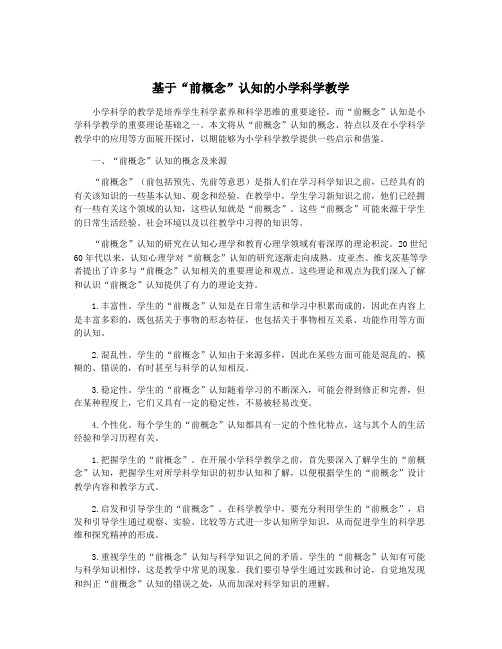
基于“前概念”认知的小学科学教学小学科学的教学是培养学生科学素养和科学思维的重要途径,而“前概念”认知是小学科学教学的重要理论基础之一。
本文将从“前概念”认知的概念、特点以及在小学科学教学中的应用等方面展开探讨,以期能够为小学科学教学提供一些启示和借鉴。
一、“前概念”认知的概念及来源“前概念”(前包括预先、先前等意思)是指人们在学习科学知识之前,已经具有的有关该知识的一些基本认知、观念和经验。
在教学中,学生学习新知识之前,他们已经拥有一些有关这个领域的认知,这些认知就是“前概念”。
这些“前概念”可能来源于学生的日常生活经验、社会环境以及以往教学中习得的知识等。
“前概念”认知的研究在认知心理学和教育心理学领域有着深厚的理论积淀。
20世纪60年代以来,认知心理学对“前概念”认知的研究逐渐走向成熟。
皮亚杰、维戈茨基等学者提出了许多与“前概念”认知相关的重要理论和观点。
这些理论和观点为我们深入了解和认识“前概念”认知提供了有力的理论支持。
1.丰富性。
学生的“前概念”认知是在日常生活和学习中积累而成的,因此在内容上是丰富多彩的,既包括关于事物的形态特征,也包括关于事物相互关系、功能作用等方面的认知。
2.混乱性。
学生的“前概念”认知由于来源多样,因此在某些方面可能是混乱的、模糊的、错误的,有时甚至与科学的认知相反。
3.稳定性。
学生的“前概念”认知随着学习的不断深入,可能会得到修正和完善,但在某种程度上,它们又具有一定的稳定性,不易被轻易改变。
4.个性化。
每个学生的“前概念”认知都具有一定的个性化特点,这与其个人的生活经验和学习历程有关。
1.把握学生的“前概念”。
在开展小学科学教学之前,首先要深入了解学生的“前概念”认知,把握学生对所学科学知识的初步认知和了解,以便根据学生的“前概念”设计教学内容和教学方式。
2.启发和引导学生的“前概念”。
在科学教学中,要充分利用学生的“前概念”,启发和引导学生通过观察、实验、比较等方式进一步认知所学知识,从而促进学生的科学思维和探究精神的形成。
前概念是小学科学学习的起点
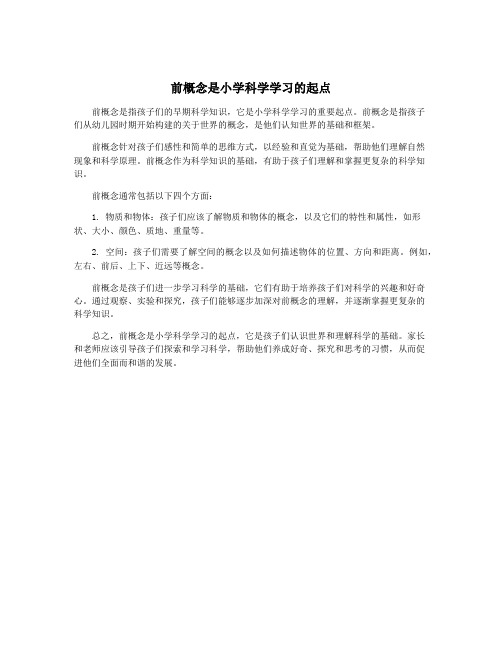
前概念是小学科学学习的起点
前概念是指孩子们的早期科学知识,它是小学科学学习的重要起点。
前概念是指孩子
们从幼儿园时期开始构建的关于世界的概念,是他们认知世界的基础和框架。
前概念针对孩子们感性和简单的思维方式,以经验和直觉为基础,帮助他们理解自然
现象和科学原理。
前概念作为科学知识的基础,有助于孩子们理解和掌握更复杂的科学知识。
前概念通常包括以下四个方面:
1. 物质和物体:孩子们应该了解物质和物体的概念,以及它们的特性和属性,如形状、大小、颜色、质地、重量等。
2. 空间:孩子们需要了解空间的概念以及如何描述物体的位置、方向和距离。
例如,左右、前后、上下、近远等概念。
前概念是孩子们进一步学习科学的基础,它们有助于培养孩子们对科学的兴趣和好奇心。
通过观察、实验和探究,孩子们能够逐步加深对前概念的理解,并逐渐掌握更复杂的
科学知识。
总之,前概念是小学科学学习的起点,它是孩子们认识世界和理解科学的基础。
家长
和老师应该引导孩子们探索和学习科学,帮助他们养成好奇、探究和思考的习惯,从而促
进他们全面而和谐的发展。
儿童的前科学概念与转变

小孩的前科学看法与转变范学军一、什么是前科学看法(一)对于小孩前科学看法界定在平时的科学教课中,你能否是也有这样的疑惑:有些科学知识学生学起来没有兴趣,有些科学知识不论怎么讲,学生都出现错误的认识,比方烧水时冒出的“白气”学生认为是水蒸气,浮在水面的物体遇到的浮力大等等。
出现错误的认识究竟是什么原由呢?踏进科学教室的小孩,其实不是一张白纸,他带着进入讲堂以前累积的全部生活经验,包含他在过去学习和生活中看到的各样现象、形成的各样看法,以及他们个体的想法,此中有一部分与此刻广泛认可的科学理论是一致的,有一些则是不一致的。
它们是小孩在接受正式的科学看法教育以前,对平时生活中所感知的现象,经过长久的经验累积和鉴别式学习而形成的对事物的非实质的认识。
比方 : 一些小孩认为鸡不是鸟 , 鳄鱼属于两栖动物等等。
小孩的这些看法来自他们对自然现象的感觉体验、平时语言、大众传媒、科学课程、家庭情境中的对话等。
建构主义认为小孩的这些看法其实不是一些简单、琐碎的错误信息 , 小孩有自己的“朴实物理理论”、“朴实生物理论”等 , 他们有自己解说、剖析有关现象和事物的方法 , 只管他们的解说可能与科学的看法有很大不同。
所以相对于科学看法而言 , 我们称之为前科学看法,简称前看法。
“前看法” 的提法最早由前苏联心理学家维果斯基提出,他将看法分红平时看法和科学看法两类:平时看法又称为前科学看法、错误看法。
也有人把前看法也叫科学前看法、平时看法、迷思看法、还有看法、直觉看法、天真谛论等。
对于“前科学看法”的界定,国内外教育界对此都有所研究。
我们对北京师范大学生命科学学院李顶峰、刘恩山所撰写的“‘前科学看法’的术语和定义的综述”一文中对“前科学看法”的界定表示认可。
他们的看法是:在理论上,前科学看法指的是学习者将科学看法的内涵增添、减少或代替,致使外延扩大、减小或移位的看法。
韦钰博士在《研究式科学教育教课指导》一书中也指出“心理学往常以人们掌握看法的门路不同将看法分红平时看法和科学看法。
前概念是小学科学学习的起点
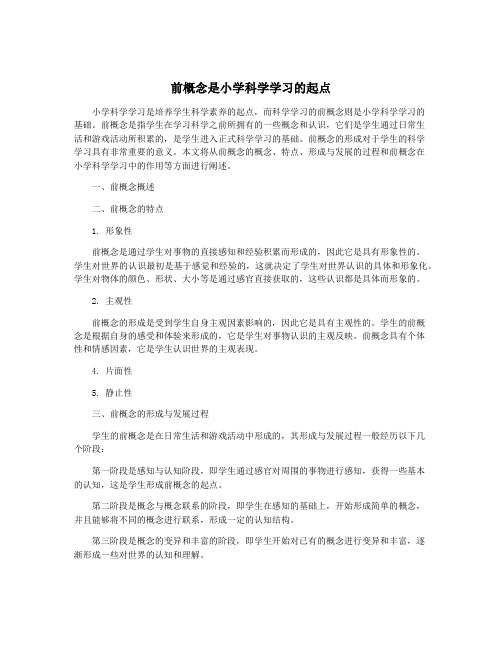
前概念是小学科学学习的起点小学科学学习是培养学生科学素养的起点,而科学学习的前概念则是小学科学学习的基础。
前概念是指学生在学习科学之前所拥有的一些概念和认识,它们是学生通过日常生活和游戏活动所积累的,是学生进入正式科学学习的基础。
前概念的形成对于学生的科学学习具有非常重要的意义。
本文将从前概念的概念、特点、形成与发展的过程和前概念在小学科学学习中的作用等方面进行阐述。
一、前概念概述二、前概念的特点1. 形象性前概念是通过学生对事物的直接感知和经验积累而形成的,因此它是具有形象性的。
学生对世界的认识最初是基于感觉和经验的,这就决定了学生对世界认识的具体和形象化。
学生对物体的颜色、形状、大小等是通过感官直接获取的,这些认识都是具体而形象的。
2. 主观性前概念的形成是受到学生自身主观因素影响的,因此它是具有主观性的。
学生的前概念是根据自身的感受和体验来形成的,它是学生对事物认识的主观反映。
前概念具有个体性和情感因素,它是学生认识世界的主观表现。
4. 片面性5. 静止性三、前概念的形成与发展过程学生的前概念是在日常生活和游戏活动中形成的,其形成与发展过程一般经历以下几个阶段:第一阶段是感知与认知阶段,即学生通过感官对周围的事物进行感知,获得一些基本的认知,这是学生形成前概念的起点。
第二阶段是概念与概念联系的阶段,即学生在感知的基础上,开始形成简单的概念,并且能够将不同的概念进行联系,形成一定的认知结构。
第三阶段是概念的变异和丰富的阶段,即学生开始对已有的概念进行变异和丰富,逐渐形成一些对世界的认知和理解。
这些阶段是前概念形成和发展的一般规律,但其具体过程会因个体差异和环境条件等因素而有所不同。
在这一过程中,教师应该根据学生的特点和发展规律,帮助学生形成健康的前概念,为学生的科学学习打下坚实的基础。
四、前概念在小学科学学习中的作用在小学科学教学中,教师应该根据学生的前概念特点,科学合理地引导学生进行科学学习。
小学科学教学中的前概念及教学对策

所理 解 的 部 分 。所 以 , 即便 在学 习后 学生 通 常 也 不 会放 弃 原 有 的 概 念 . 而
是 对 新 概 念加 以排 斥 . 至 扭 曲对 新 甚 概 念 的 理 解 而 导 致 了 学 生 头 脑 中存
在 的与 科 学概 念 不 一 致 的 认识
1以 自身 的 前 概 念 为 基 石 . . 自我
必 须 充 分 了解 学 生 科 学 学 科 的 原 有
知识 经 验 背 景 . 了解 学 生 有 哪 些 概 念 是 片 面 的甚 至 是 对立 的 . 充 分 运 用 并 学 生 的 原 有 概 念 创 设 教 学 中 的认 知
根 导 线 . 个 小 电 珠 他 们 带 着 自 一 让 己 的前 概 念 随 意摆 弄 。两 个 要 求 : 一
间 的 矛 盾 冲 突 . 现 由前 概 念 向科 学 实
概 念 的 转 变
的看 法 往 往 是 片 面 的 、 糊 的 。在 学 模 习新 知 识 时 . 少 学 生 只 注 意 到 自己 不
四 、 学 科 学 教 学 的 基本 对 策 小 利 用 什 么 方 式 可 以 有 效 地 进 行 概 念 转 变 呢 ?在 实 际 教 学 中 , 有这 样 几 种 基 本对 策 : 道 导 线应 该 怎 么 与 电珠 和 电池 相 连 。 心 急 的 同学 不 断 向教 师 打 听 正 确 的 连法 , 师故 意 置 之 不 理 。 教 突然 , 有个 同 学 的 小 电珠 亮 了 .大 家 都 异 常 兴
冲突. 以此 作 为 引 发 学 生 进 行 概 念 转
变 学 习 的契 机 。 为要 转 变 学 生 的 前 因
概 念 . 仅 告 诉 学 生 “ 确 ” 概 念 是 仅 正 的 无 效 的 .只 有 在激 励 性 的情 境 中 . 在 学 生 的 前 概 念 与科 学 概 念 的 激 烈 碰 撞 中 . 能 解 决 前 概 念 与科 学 概念 之 才
小学生一些经典的科学前概念

小学生一些经典的科学前概念
调查以下这些科学前概念的方法主要有访谈法和提问法,另外在访谈中有的还用到了绘图和实验操作等手段。
研究的对象主要是8-12岁的小学生。
1.力与运动
对于力与运动,8-11岁的学生普遍存在以下五种观点:
(1)力与活着的物体的有关,只有具有生命的物体才有力;
(2)物体运动的时候一定有力的作用;
(3)物体运动得速度越快,它所受到的力也就越大;
(4)如果物体不运动了,它就不受力了;
(5)假如一个物体在运动着,那么作用在它上面力的方向与物体的运动方向一致。
持观点(1)的多是一些年龄相对较小的学生。
其他四种观点在这些学生中间极其普遍。
如上图所示,学生认为物体在下落的过程中会受到向下的力作用,物体下落得越快受到的力就越大;当物体往上运动时会受到向上的力的作用,当物体上升到最高点时它就不受力了。
2.有关人的消化道
当访谈者问:学生食物从口进入以后,它们在人体内所经过的路径如何?学生的回答大致归为下图中的三类: 一个入口,一个出口,如图(a)所示;两个入口,一个出口, 如图 (b)所示; 两个入口,没有出口,如图(c)所示。
3.有关简单电路
访谈者首先让8-11岁的学生用一节电池、两根导线来点亮一个小灯泡。
当灯泡亮了以后,让他们解释电路的电流情况。
学生一般有以下三种解释:第一种观点如图 (a)所示,学生认为电流从电池的正极出发到达灯泡,于是灯泡就亮了;第二种观点如图 (b)所示,学生认为电流从电池两端出发到达灯泡;第三种观点 如图(c)所示,电流从正极出发,然后经过小灯泡,最后流回负极。
第三种观点是科学的。
“前科学概念”的术语和定义的综述

一
代前科学概念 的是 Jhs n Mc oa ont eA、 D n dJ和 WebG o l b 在 17 9 7年发表 的文章 “ 中小学热 力学 中 的错 误概念 ”
中使用 的术语 “ 错误概 念” m socp os 。 ( i nef n ) c i
林林 总总的前科学概念 的术语依研究 的不同可分 为两大类 。一类是 “ 以科学 知识 为依 据的术语 ” hm - (o o
关键词 : 前科 学概念 ; 术语 ; 定义 中图分 类号 :4 G2 文献标识码 : A 文章 编号 :08—0 2 ( 06 0 04 0 10 6 7 20 ) 6— 0 3— 3
“ 前科学概 念” 的术语 对前 科学 概念 的研究 具有
很大的影响 , 因为“ 词的错误和不恰 当的选择 会极大 的 阻碍理解” Fa c ao ,60 ; 前科 学 概念 ” ( rni B cn 12 ) “ s 的术 语和定义是前科学概念 的研究 人员必须要 面对 的首要
V0 . 8 N0. 12 6 De . 2 o c 06
前 科 学 概念 ” 的术 语 和 定 义 的综 述
李 高峰, 恩 山 刘
( 北京师 范大学 生命科 学学院 , 北京 10 7 ) 0 8 5
摘要: 文章对“ 前科 学概念 ” 的术语和定义进行 了综述 , 绍 了“ 科学概 念” 介 前 的术语及 其分类 、 前科 学 “ 概 念” 的概念 的不 同界 定, 讨论 了其分歧 , 并概述 了 自己关于前科 学概念 的术语及其 定义的观 点。
“ 童 关 于 性 和 生 育 的 概 念 ”( hlrn Scnet o 儿 C i e ’ ocps f d
t n) 朴 素理 论 ( a et o e ) 朴 素认识 ( av e is、 o n i h r s 、 v ei ni b — e l f 、 科 学 概 念 ( rsin f ocp os 、 概 念 is 前 e) pec t ccnet n ) 前 ei i i ( rcnet n ) 教育 前 观念 ( risu tn e ) p ocp os 、 e i pe t co a i a 、 n r i l ds
前科学概念下初中化学教学方法的研究与实践

根据调查 问卷的分析结果 , 针对化学用语 、 基本概念 、 基本理
论 中的部分相关 内容 ,在教学方法的具体实践过程 中着重实现 以
下几个 目标 : ( 1 ) 探查学生的前科 学概念 。
( 2 ) 利用能够激起学生前科学概 念与科学概念 之间冲突 的事 让学生尽量用 自己的前 科学概念去解 释 , 同时不 断地 发问 , 直 ( 4 ) 教科书中—些不确切的词语或插图的引用引起刘概 念的误解。 例,
到学生发现用 自己的前科学概念再不能解 释为止 。 ( 6 ) 教师本身对知识理解 的偏 差引起学生的错误 。 和语言描述 , 也会对某些概念产生模糊 的认识 。
( 3 ) 引导学生使用新 的 、 科学 的知识解 决问题 , 使新知识 替代
。 下面用一个 典型的例子来说明某些知识点 的教学过程 。 案例 : 课题“ 质量守恒定律” 的引入 。 教师: 大家学 习过物理 , 物理学里有一个很著名 的守恒定律 ,
通过实验班和普通班 的测验水平进行评 价 ,了解 教学实践对
学生知识掌握所起 的作用 ,从而得 出教学实践是 否能帮助学生更 和影响 的, 旧的 、 错误 的认 知结构被打破 , 取而代 之的是新 的 、 科学 好地掌握化学概念和理论 的结论 。 的认 知 结 构 。 下表为实验班和普通班在学习人教版新教材 中的 “ 自然界的
教 师: 好。 在化学里 , 也有一个很著名的守恒定律 , 跟物理 的能 量守恒定律很近似 , 叫做质量守恒定律 , 也就是说 , 在化学反应 里 , 质量也是不 能凭空产生 , 凭空消失 的。接下来 , 我们用几个实验来
验证一下 , 同时注意观察 , 解释实验 现象 。
概述初中科学教学的前科学概念
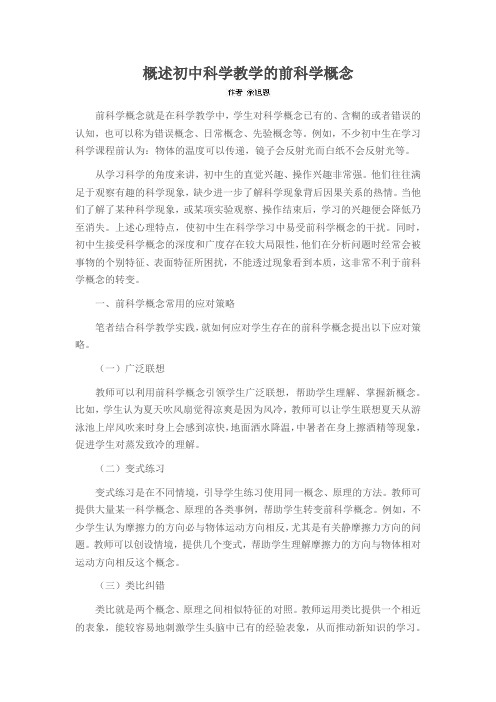
概述初中科学教学的前科学概念前科学概念就是在科学教学中,学生对科学概念已有的、含糊的或者错误的认知,也可以称为错误概念、日常概念、先验概念等。
例如,不少初中生在学习科学课程前认为:物体的温度可以传递,镜子会反射光而白纸不会反射光等。
从学习科学的角度来讲,初中生的直觉兴趣、操作兴趣非常强。
他们往往满足于观察有趣的科学现象,缺少进一步了解科学现象背后因果关系的热情。
当他们了解了某种科学现象,或某项实验观察、操作结束后,学习的兴趣便会降低乃至消失。
上述心理特点,使初中生在科学学习中易受前科学概念的干扰。
同时,初中生接受科学概念的深度和广度存在较大局限性,他们在分析问题时经常会被事物的个别特征、表面特征所困扰,不能透过现象看到本质,这非常不利于前科学概念的转变。
一、前科学概念常用的应对策略笔者结合科学教学实践,就如何应对学生存在的前科学概念提出以下应对策略。
(一)广泛联想教师可以利用前科学概念引领学生广泛联想,帮助学生理解、掌握新概念。
比如,学生认为夏天吹风扇觉得凉爽是因为风冷,教师可以让学生联想夏天从游泳池上岸风吹来时身上会感到凉快,地面洒水降温,中暑者在身上擦酒精等现象,促进学生对蒸发致冷的理解。
(二)变式练习变式练习是在不同情境,引导学生练习使用同一概念、原理的方法。
教师可提供大量某一科学概念、原理的各类事例,帮助学生转变前科学概念。
例如,不少学生认为摩擦力的方向必与物体运动方向相反,尤其是有关静摩擦力方向的问题。
教师可以创设情境,提供几个变式,帮助学生理解摩擦力的方向与物体相对运动方向相反这个概念。
(三)类比纠错类比就是两个概念、原理之间相似特征的对照。
教师运用类比提供一个相近的表象,能较容易地刺激学生头脑中已有的经验表象,从而推动新知识的学习。
如在学习压强概念时,学生已经有了速度概念,可以引导进行类比,促进学生理解压强的概念,减少相关原科学概念的干扰。
(四)逻辑归谬逻辑归谬就是首先假设学生的观点是正确的,然后利用其想法或思路归纳出与事实或已知的概念、原理相悖的结论,让学生在冲突中发现自己的原科学概念存在错误,进而改进、完善。
科学概念教学的前概念

科学概念教学的前概念科学概念教学的前概念包括科学、科学概念、教学和前概念的概念。
科学是研究自然现象和规律的知识体系和方法论,是认识世界和改造世界的一种重要方式。
科学概念是科学中的基本要素,是描述、解释和预测现象的基本概念和原则。
教学是将知识、技能和价值观传授给学生的过程,是学习和教育的重要环节。
前概念是指学生在学习科学概念之前所具备的先验知识、观念和经验。
下面将分别从科学概念、教学和前概念的角度对科学概念教学的前概念进行讨论。
科学概念是科学知识的核心,是科学研究和实践的基础。
科学概念具有准确性、普遍性和稳定性等特点,能够描述、解释和预测自然现象和规律。
科学概念通常包括概念定义、属性和关系等要素,可以通过实验观察、思维推理和数学推导等方法进行建构和验证。
在教学中,科学概念可以作为教学内容的重要组成部分,通过教学活动和学生的学习实践来达到对科学概念的理解和掌握。
教学是科学概念传递和学习的过程。
在科学概念教学中,教师应通过设计教学活动和采用有效的教学策略来促进学生对科学概念的理解和运用能力的提高。
教师可以利用多媒体、实验、讨论和问题解决等方式来激发学生的兴趣,引导学生积极参与到教学中。
同时,教师还应注意培养学生的科学思维和科学方法,帮助学生建立科学概念与实际问题的联系,使学生能够将科学概念应用到实际生活中。
前概念是学生在学习科学概念之前所掌握的知识、观念和经验。
学生的前概念往往基于其日常观察和经验,具有直观性、片面性和错误性等特点。
学生的前概念可能会与科学概念存在差异和冲突,影响学生对科学概念的理解和学习成效。
因此,在教学中要充分考虑学生的前概念,通过对学生的前期认知状况的了解,针对性地设计教学活动和策略,帮助学生逐步建立正确的科学概念。
在科学概念教学中,应当充分重视学生的前概念,将其作为教学过程中的参照物和桥梁,引导学生从自己的经验和观念出发,逐步理解和接受科学概念。
教师可以通过激发学生的好奇心和主动性,开展启发式的教学,引导学生通过实验和观察事实,从而发现、纠正和重构自己的前概念。
前科学概念

• 3.采集方法及过程:现代造血干细胞移植法采用从外周血
中采集造血干细胞。用科学方法将骨髓血中的造血干细胞
大量动员到外周血中,从捐献者手臂静脉处采集全血,通
过血细胞分离机提取造血干细胞,同时,将其它血液成份
回输捐献者体内。采集总共大约10克的造血干细胞。含部
分血液成分,一般是50~100毫升。
37
二、前科学概念的揭示
一个湖泊
10
一、概念的组成要素
• 4.概念的例证:特例
–特殊的例子 –从内涵看,它不符合“概念的质的规定性” –从外延看,它是这一概念的对象
• “微生物”的特例:“蘑菇”“银耳”“黑 木耳”“金针茹”
• 真核生物的细胞一般都有细胞核,但高等哺 乳动物成熟的红细胞没有;
• 植物细胞有叶绿体,但根尖细胞没有; • 一般的酶具有专一性,固氮酶例外
–√绿色植物时刻都在进行着呼吸作用,只有 在有光的条件下才能进行光合作用。
• 8.显微镜下观察玻片标本,其观察对象 位于视野的右上方,要使物像移至视野 中央,需要将玻片向左下方移动。 错
31
二、前科学概念的揭示
• 9.双名法规定,每一种生物只能有一个 科学名称,即学名,包括属名和种名。 对
• 10.禽流感不仅能在禽类中传播,而且能 传染哺乳动物和人类。对
28
二、前科学概念的揭示
• 5.黑色人种、白色人种、黄色人种、棕 色人种、红色人种是不同的种。 错
–人种亦称“种族”,指的是同一起源并在体 质形态上具有某些共同遗传特征的人群。
–种,物种的简称。指具有一定的形态特征和 生理特性,以及一定的自然分布区的生物类 群。是生物分类的基本单位。
–√从生物学的分类来看,全世界任何人种同 属一个物种──智人种。
“前科学概念”的定义

Lus d m(9 5 在研究 中也主张用 “ oiO o 19 ) 错误概 念” 他说 “ , 错 比, 否定 的意味要少 些 ;前科学 概念” “ 是特定 的科 学 ; 习 学 误概念是学生拥有的与通常从科学家那里获得 的概念不 同 者拥有 的前科学概念最终会把学习者引导到当前的科学概
pe s nt n r sor a i rod a a si T an f m ton Pe i
n e so ft eman n e s9 e s n sa d t e ea e e d i neo i e d fp a a t n h r r h a e ie e e s i h e d h e a c y o a a t. r a d fr n e n te n e i r r h pe s n sThe f p p r ls r v a s ha t e a e a o e e t t h moi e o ma n a l t s f v ki g
或 者 是 错 误 的 ( iae )理解 ( n e t d g” Jme H ms kn t u dr a i )(a s . sn n
G o (9 1 主张 用 “ 科 学 概念 ” 简 称 “ 慨念 ” od 19 ) 等 前 , 前
Wa d r e Je . nzs Jsp D N v k 1 9 ) A tu (rcnet n ) 他 认 为 , 前 科 学 概 念 ” “ 误 概 念 ” n e e , l Mi e , e h . o a ,9 4 。 r r peo cpi s。 s o J t o h o “ 和 错 相
Wad r e19 ) 为 , 异 概 念 是 学 习 者 在 经 验 基 础 n es (9 4认 e 相
前科学概念生理学举例

前科学概念生理学举例
生理学是研究生物体生命现象及其调节的科学,以下是一些前科学概念生理学的举例:
1. 传统中医理论对生理学的影响:中医的理论以阴阳理论、五行理论和气血理论为基础,认为人体的生命活动与宇宙自然规律相一致,故对许多生理学问题提供了独特的看法和方法,如五脏六腑的功能、经络系统的作用等。
2. 细胞学的发展对生理学的影响:随着细胞学的发展,人们对细胞结构和功能的理解越来越深入,从而开创了许多研究生理学的新方法和方向,如蛋白质的合成与代谢、神经递质的传递等。
3. 生物化学的发展对生理学的影响:生物化学的出现和发展,极大地促进了生理学的研究。
生物化学研究生命活动的基本化学过程和分子机制,如酶的作用、代谢途径、能量转化等问题。
4. 水文学的发展对生理学的影响:水文学是一门研究水文规律和水循环的学科,它对生理学的影响主要在水分代谢的研究中。
例如,饮水量、尿量、汗量等方面的水分代谢研究基本都是在水文学基础上展开的。
5. 免疫学的发展对生理学的影响:免疫学是生理学的一个重要领域,它研究人体的免疫系统和免疫相应,探讨机体与外界自然界的界面。
因此,免疫学知识对于生理学研究是非常有帮助的。
聚焦“前概念”的科学教学

聚焦“前概念”的科学教学什么是“前概念”“前概念”是指在学习某一学科或领域之前需要掌握的基础知识,它们是学生能否理解和掌握新知识的重要前提。
在科学教学中,“前概念”指的是与某一科学领域相关的基础概念、原理、理论或实验方法等等。
在科学教学中,学习者的成功与否取决于他们是否掌握了与学科相关的前概念。
如果学生没有掌握前概念,那么后续的知识就很难理解和掌握。
因此,重视前概念对于科学教学来说是至关重要的。
为什么要重视“前概念”在科学教学中,如果忽视前概念,会导致以下后果:•学生学习困难:如果学生没有掌握前概念,很难理解新知识的含义,更难将其应用到实际问题当中。
•学生对该领域的兴趣降低:如果学生没有掌握前概念,他们对课堂上的内容可能感到举步维艰,对该领域的兴趣也会随之降低。
•学生无法解决实际问题:如果学生没有掌握前概念,他们很难将所学知识应用到实际问题当中,很难发挥科学知识的应用价值。
综上所述,重视前概念对于科学教学来说是非常必要的。
如何在科学教学中重视“前概念”在科学教学中,为了确保学生掌握了前概念,有以下方法可供选择。
按照前概念分类教学一种方法是按照前概念进行分类教学,让学生先掌握前概念,再进行新知识的学习。
例如,在教授化学中,可以将原子理论、分子理论、化学键、反应类型等等“前概念”按照适当的顺序教授。
引入前概念的教学方法另一种方法是引入前概念的教学方法,即在教学新知识之前,通过回顾前一个主题来引入前概念。
例如,如果教授“摩擦力”的概念,可以让学生回想一下之前已经学过的力的概念,再慢慢引出摩擦力的概念。
演示法演示法是一种有效的学习前概念的方法,教师可以使用实验演示、多媒体演示等手段来展示前概念的实际应用。
例如,在教授电流的概念时,教师可以使用实验器材演示电路中电流的流动,帮助学生直观地了解电流的概念。
知识框架法知识框架法是一种建立前概念体系的学习方法。
通过分层渐进式的学习和理解,学生逐渐建立了前概念的框架,并将其应用到学习新知识的过程当中。
最新 “前概念”及“相异构想”教学问题概述——主要

“前概念”及“相异构想”教学问题概述——主要以初中化学为例一、“前概念”简述学生在成长过程中经历着对自然界的不断观察、探索与学习。
因此,他们在接受科学知识学习时,头脑里已经不是一片空白,更不是一无所知,生活中积累的各种知识经验使他们形成了对某些问题或现象的独特理解与看法,建立起了相对稳定的个人观点及思维。
认知心中将这种在接受正规科学之前就已经形成的观念统称为“前科学概念”,简称“前概念”(preconception)。
这里的“概念”是指个体对某一对象的认识、看法与理解,代表的是某种观念,比如,“氧气能供给呼吸”就是一个概念(观念)。
因此,“前概念”是普遍存在的。
其主要特点有——1.差异性。
在成长过程中学生接触到形式各异的物质,观察到绚丽多姿的现象。
但由于各自的背景、家庭环境、生活经历的差异,他们对这些事物或现象的看法也会产生分歧。
因此,学生的“前概念”因人而异、各不相同。
2.隐蔽性。
“前概念”大多不是通过家长或别人(同伴、老师等)教授所得,而是长期潜移默化、耳闻目染的结果。
因此它很多时候是潜伏在学生的思维体系中,长期处于休眠期,不容易被他人发现,甚至自身也难于察觉。
但是一旦学生在遇到或学习相关知识时,潜伏的“前概念”就会适时出现,并参与到知识建构中。
3.顽固性。
“前概念”大多为学生亲身体验所得,所以一旦建立,学生就会深信不疑且根深蒂固,呈现出极强的顽固性。
4.反复性。
有些学生在经过一定的学习后,逐渐矫正了其中一些不合理的“前概念”。
但如果科学概念没有真正建立,一段时间后头脑中的“前概念”又会“死灰复燃”。
如初中化学从得氧与失氧的角度分析“氧化—还原”反应,学生对于“氧化”两字印象特别深刻,所以在高中阶段分析诸如“氢气在氯气中燃烧”之类的没有“氧元素”出现的“氧化—还原”反应时就会难于着手,一筹莫展。
虽然通过教师的讲解、分析学生能勉强接受,但常常还是会一而再、再而三地出现差错,这与初中阶段学习“氧化—还原”反应后所形成的“前概念”是分不开的。
科学前概念的分析及应用

科学前概念的分析及应用著名发展心理学家皮亚杰的研究显示,学生在学习科学课程之前,头脑里并非是一片空白,他们在日常生活中,对客观世界中的各种事物已经形成了自己的看法,并无形中养成了各自独特的思维方式。
这种在接受正规的科学教育之前所形成的概念一般称之为科学前概念(The concept of Science),简称前概念。
在实际教学实践中不难看出,前概念最大的一个特点就是顽固。
本文就着重从前概念的转变条件入手,分析并介绍前概念在教学中的应用。
前概念的转变条件美国康奈尔大学的波斯纳等人借鉴了库恩、拉卡托斯等当代科学哲学家的思想,针对概念转变发生的条件,提出了著名的概念转变模型(Conceptual Change Model,简称CCM)。
他们认为一个人原有的前概念要发生改变需要具备以下四个条件:对现有概念的不满;新概念的可理解性;新概念的合理性;新概念的有效性。
根据这个模型,前概念可以分成两种,一种是具有正向迁移作用的前概念,当新的科学概念和前概念比较一致时,学生在探究活动中往往会表现得比较活跃和积极,就容易达成相应的教学目标;一种是具有负向迁移作用的前概念,当新的科学概念和前概念产生冲突时,前概念则会严重干扰科学概念的构建,相应的教学任务也不易完成。
在日常科学教学研究与实施策略中,不能人为地将前概念的这两种作用相互割裂,而应平等地加以重视。
前概念在教学中的应用利用前概念的正向迁移作用完成知识迁移前概念实际上是不可多得的教学资源,要让个体看到它对自己的价值,看到它能解决的实际问题。
当然前概念的运用也是学习的目的,也是检验前概念掌握情况的重要标志,还是加深对原有概念理解的重要环节。
因为只有通过运用,学生对概念理解上的缺陷才能暴露出来,才能进一步有针对性地加以纠正、完善和深化对科学概念的理解。
如在学习六年级上册《谁选择了它们》一课时,通过对田野里生活着的绿青蛙,和沙漠中生活着的黄青蛙生活环境的分析,学生总结出“当周围环境发生变化时,生物的形态结构也会发生变化”这一科学概念(前概念)。
_前科学概念_的术语和定义的综述_李高峰
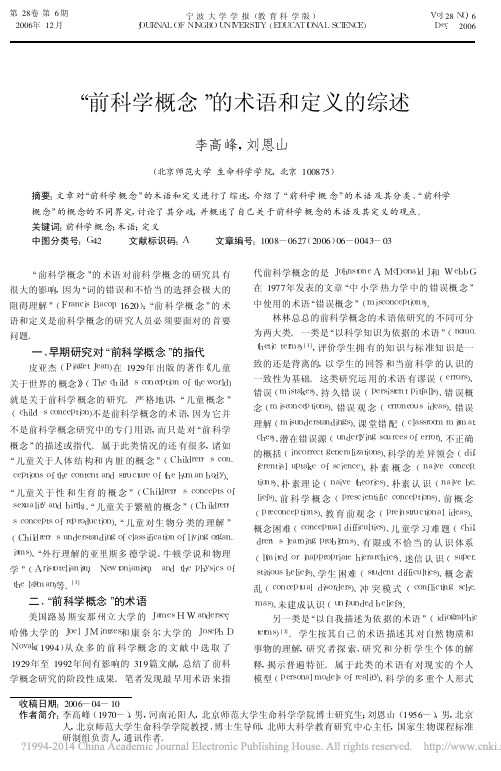
第28卷第6期2006年12月宁波大学学报(教育科学版)J O U R N A LO FN I N G B OU N I V E R S I T Y(E D U C A T I O N A LS C I E N C E )V o l .28N O .6D e c . 2006“前科学概念”的术语和定义的综述李高峰,刘恩山(北京师范大学生命科学学院,北京100875)摘要:文章对“前科学概念”的术语和定义进行了综述,介绍了“前科学概念”的术语及其分类、“前科学概念”的概念的不同界定,讨论了其分歧,并概述了自己关于前科学概念的术语及其定义的观点。
关键词:前科学概念;术语;定义中图分类号:G 42 文献标识码:A 文章编号:1008-0627(2006)06-0043-03 收稿日期:2006-04-10 作者简介:李高峰(1970-),男,河南沁阳人,北京师范大学生命科学学院博士研究生;刘恩山(1956-),男,北京人,北京师范大学生命科学学院教授、博士生导师,北师大科学教育研究中心主任,国家生物课程标准研制组负责人,通讯作者。
“前科学概念”的术语对前科学概念的研究具有很大的影响,因为“词的错误和不恰当的选择会极大的阻碍理解”(F r a n c i sB a c o n ,1620);“前科学概念”的术语和定义是前科学概念的研究人员必须要面对的首要问题。
一、早期研究对“前科学概念”的指代皮亚杰(P i a g e t J e a n )在1929年出版的著作《儿童关于世界的概念》(T h e c h i l d 's c o n c e p t i o no f t h e w o r l d )就是关于前科学概念的研究。
严格地讲,“儿童概念”(c h i l d 's c o n c e p t i o n )不是前科学概念的术语,因为它并不是前科学概念研究中的专门用语,而只是对“前科学概念”的描述或指代。
幼儿的前科学概念名词解释

幼儿的前科学概念名词解释科学领域的知识是我们对世界的探索和认识,而对幼儿来说,他们正处于探索世界和建构认知的阶段。
因此,提供给幼儿一些前科学概念的名词解释,有助于他们对世界的理解和认知能力的发展。
在本文中,将对一些常见的前科学概念名词进行解释。
物质:物质是指组成世界的一切实体,包括固体、液体和气体。
幼儿能够触摸到、看到和感受到的东西都是物质,例如他们身体上的衣服、玩具、食物等。
幼儿通过观察和实验,能逐渐了解物质的特点,例如固体是硬的,液体是流动的,气体是看不见的。
力:力是一个让物体发生运动或改变形状的作用,它可以推动物体或改变物体的状态。
幼儿可以通过力来推动他们的玩具车,或者用力撕纸、揉面团等。
幼儿可以通过实践活动,体验力的作用和效果,帮助他们理解力的概念。
重力:重力是地球吸引物体的力,使得物体朝着地球中心运动。
幼儿可以观察到物体从高处掉下来,或者在玩滑梯时能够很容易地滑下来。
重力的作用可以帮助幼儿理解物体掉落的原因,并为他们日常生活中的行为和运动提供解释。
能量:能量是物体具有的做功或产生变化的能力。
幼儿可以观察到一些能量的转化过程,例如看到风车转动、静电使脱离的头发贴在物体上等。
能量的概念帮助幼儿理解世界上各种运动和现象的原因,从而培养他们的观察力和思维能力。
电:电是一种形式的能量,通过导线进行传输。
幼儿可以从日常生活中观察到电的应用,例如开灯、看电视、听音乐等。
幼儿可以通过参与一些简单的实验,了解电流的流动、电灯的亮灭等现象,帮助他们理解电的概念。
温度:温度是衡量物体热量高低的物理量。
幼儿可以通过触摸物体来感受温度的差异,例如感觉到水的温暖、冰的寒冷等。
温度的概念帮助幼儿理解热和冷的区别,以及物体在不同温度下的变化和性质。
声音:声音是由物体振动产生的,通过空气传播到我们的耳朵中。
幼儿可以通过敲击不同的物体,听到不同的声音,并通过观察和实验来探索声音的产生和传播。
声音的概念帮助幼儿认识到声音是由振动产生的,从而进一步了解世界的声音现象。
- 1、下载文档前请自行甄别文档内容的完整性,平台不提供额外的编辑、内容补充、找答案等附加服务。
- 2、"仅部分预览"的文档,不可在线预览部分如存在完整性等问题,可反馈申请退款(可完整预览的文档不适用该条件!)。
- 3、如文档侵犯您的权益,请联系客服反馈,我们会尽快为您处理(人工客服工作时间:9:00-18:30)。
前科学概念的术语和定义TTA standardization office【TTA 5AB- TTAK 08- TTA 2C】“前科学概念”的术语和定义的综述李高峰刘恩山*(北京师范大学生命科学学院北京100875)摘要:本文对“前科学概念”的术语和定义进行了综述,介绍了“前科学概念”的术语及其分类、“前科学概念”的概念的不同界定,讨论了其分歧,并对未来研究作了展望。
关键词:前科学概念;术语;定义中图分类号:G42文献标识码:A“前科学概念”的术语对前科学概念的研究具有很大的影响,因为“词的错误和不恰当的选择会极大的阻碍理解”(Francis Bacon,1620);“前科学概念”的术语和定义是前科学概念的研究人员必须要面对的首要问题。
一、早期研究对“前科学概念”的指代皮亚杰(Piaget Jean)在1929年出版的着作《儿童关于世界的概念》(The child’s conception of the world)就是关于前科学概念的研究。
严格地讲,“儿童概念”(child’s conception)不是前科学概念的术语,因为它并不是前科学概念研究中的专门用语,而只是对“前科学概念”的描述或指代。
属于此类情况的还有很多,诸如“儿童关于人体结构和内脏的概念”(Children’s conceptions of the content and structure of the human body)、“儿童关于性和生育的概念”(Children’s concepts of sexuality and birth)、“儿童关于繁殖的概念”(Children’s concepts of reproduction)、“语言对儿童速度概念的影响”(The effect of language on a child’s conception of speed)、“儿童对生物分类的理解”(Children’s understanding of classification of living organisms)、“外行理解的亚里斯多德学说、牛顿学说和物理学”(Aristotelianism, Newtonianism, and the physics of the layman)等。
二、“前科学概念”的术语作者简介:李高峰(1970-),男,汉族,河南沁阳人,北京师范大学生命科学学院,生物学课程与教学论专业博士研究生;刘恩山(1956-),男,汉族,北京人,北京师范大学生命科学学院教授、博士生导师,北师大科学教育研究中心主任,国家生物课程标准研制组负责人。
美国路易斯安那州立大学的James H. Wandersee、哈佛大学的Joel J. Mintzes和康奈尔大学的Joseph D. Novak(1994)从众多的前科学概念的文献中选取了1929年至1992年间有影响的319篇文献,总结了前科学概念研究的阶段性成果。
笔者发现最早用术语来指代前科学概念的是Johnstone A., McDonald J.和Webb G.在1977年发表的文章“中小学热力学中的错误概念”中使用的术语“错误概念”(misconceptions)。
林林总总的前科学概念的术语依研究的不同可分为两大类。
一类是“以科学知识为依据的术语”(nomothetic terms),评价学生拥有的知识与标准知识是一致的还是背离的,以学生的回答和当前科学的认识的一致性为基础。
这类研究运用的术语有谬误(errors)、错误(mistakes)、持久错误(persistent pitfalls)、错误概念(misconceptions)、错误观念(erroneous ideas)、错误理解(misunderstandings)、课堂错配(classroom mismatches)、潜在错误源(underlying sources of error)、不正确的概括(incorrect generalizations)、科学的差异领会(differential uptake of science)、朴素概念(naive conceptions)、朴素理论(na?ve theories)、朴素认识(naive beliefs)、前科学概念(prescientific conceptions)、前概念(preconceptions)、教育前观念(preinstructional ideas)、概念困难(conceptual difficulties)、儿童学习难题(children’s learning problems)、有限或不恰当的认识体系(limited or inappropriate hierarchies)、迷信认识(superstitious beliefs)、学生困难(student difficulties)、概念紊乱(conceptual disorders)、冲突模式(conflicting schemas)、未建成认识(unfounded beliefs)。
另一类是“以自我描述为依据的术语”(idiographic terms)。
学生按其自己的术语描述其对自然物质和事物的理解,研究者探索、研究和分析学生个体的解释,揭示普遍特征。
属于此类的术语有对现实的个人模型(personal models of reality)、科学的多重个人形式(multiple private versions of science)、个人构想(personal constructs)、学生观念(pupil’s ideas)、学生标准(schoolchildren’s criteria)、相异概念(alternative conceptions)、相异构架(alternative frameworks)、自发推理方式(spontaneous ways of reasoning)、自发推理(spontaneous reasoning)、发展中概念(developing conceptions)、儿童科学(children’s science)、儿童观点(children’s views)、儿童知识(children’s knowledge)、儿童理解(children’s understanding)、直觉认识(intuitive beliefs)、常识理论(commonsense theories)、日常物理和化学概念(everyday physical and chemical conceptions)。
Haluk zmen(2004)在文章“学生在化学中的一些错误概念:化学键的文献综述”中也汇总了“前科学概念”的术语。
他说,学生的先前认识与其通过科学交流获得的概念不同,这些概念在科学教育文献中被标上了各种各样的标签:错误概念(迷思概念)、相异概念(异类概念)、相异科学概念(common alternative science conceptions)、相异构想、相异感知(alternate perceptions)、朴素观念、朴素理论、儿童科学直觉(children's scientific intuitions)、儿童科学、常识性理解(common sense understanding)、常识性概念(common sense concepts)、相异概念框架(alternative conceptual framework) 、概念框架(conceptual frameworks)、直觉概念(intuitive conceptions)、直觉科学(intuitive science)、学生直觉理论(students' intuitive theories)、前科学概念、学生描述-解释系统(students'descriptive and explanatory systems)、自发性知识(spontaneous knowledge)。
除此之外,有的学者用的术语是替代概念(alternate conception)、抛锚概念(anchoring conceptions)、抛锚观念(anchoring idea)、直觉观念(intuitive ideas)、教学前概念(preinstructional conception、pre-instruction conception)、模糊概念(fuzzy conception)、原始概念(primitive conceptions)、民间概念(folk concept)等。
三、“前科学概念”的定义错误概念是历史上研究之初、学者们首选的术语。
错误概念的意思是“对事物含糊的(vague)、不完善的(imperfect)或者是错误的(mistaken)理解(understanding)”(James ,Joel ,Joseph ,1994)。
Arthur Louis Odom(1995)在研究中也主张用“错误概念”,他说“错误概念是学生拥有的与通常从科学家那里获得的概念不同的观念(ideas)”。
Haluk zmen(2004)列举了表示前科学概念的19个术语,这些术语在使用上未达成一致。
他说,“为简便起见,本文使用错误概念这个术语,意思是与普遍接受的术语的科学理解不同的概念。
”错误概念由学习者普遍拥有,难以“教掉”(teach away),和当前的科学知识是不同的。
错误概念暗示,此等概念具有消极意义,对学习者的认知目的不起作用,应尽快消除。
在“错误概念”被提出之后,对学生拥有的前科学概念的界定有许多不同的声音。
有人认为,错误概念是错误的概念,主张用“错误”(mistake)来取代“错误概念”。
如Gowin(1983)就建议将术语简化,由错误概念改成错误。
认同此观点的学者不多。
绝大多数科学教师赞同使用“错误概念”。
他们认为,“错误”比“错误概念”有更强的、更明确的否定的内涵,意指糟糕的认识或是将主要规则和原理置之度外,这是不恰当的。
“错误概念”表达的概念能够代表“和当前科学思想不一致的观念(idea)”,它对于科学教师和普通大众、甚至门外汉来说都非常易于理解,而且从一开始就用“错误概念”,它已是科学教师熟悉的行话了。
后来,许多研究者,如Abimbola(1988)、Gilbert和Swift(1985),都偏爱“相异概念”,而不用原先占主导地位的“错误概念”。
他们认为“相异概念”不仅指出了“学习者对一系列可理解的自然现象和物体建构了基于经验的解释”,而且这个术语也暗示,学习者拥有相异概念是有理由的、合理的,它给拥有这些概念的学习者以智力上的尊重。
